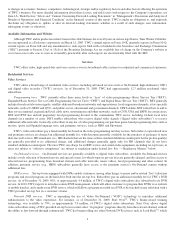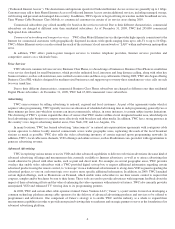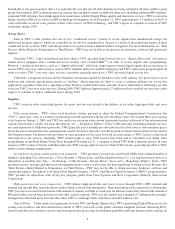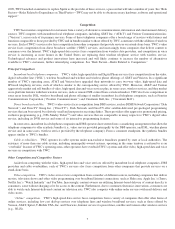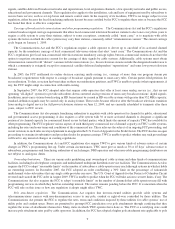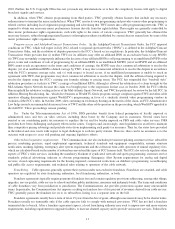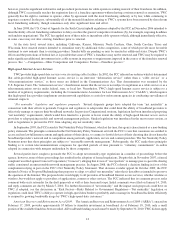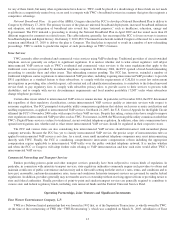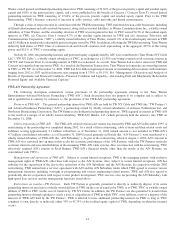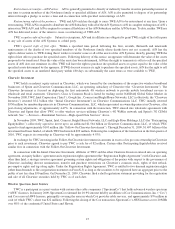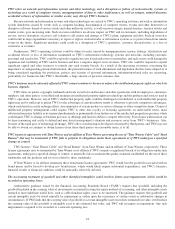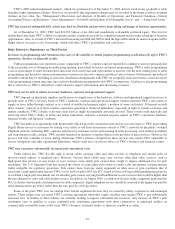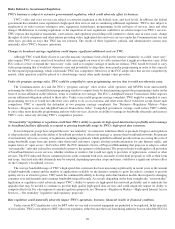Time Warner Cable 2009 Annual Report Download - page 24
Download and view the complete annual report
Please find page 24 of the 2009 Time Warner Cable annual report below. You can navigate through the pages in the report by either clicking on the pages listed below, or by using the keyword search tool below to find specific information within the annual report.however, provides significant substantive and procedural protections for cable operators seeking renewal of their franchises. In addition,
although TWC occasionally reaches the expiration date of a franchise agreement without having a written renewal or extension, TWC
generally has the right to continue to operate, either by agreement with the local franchising authority or by law, while continuing to
negotiate a renewal. In the past, substantially all of the material franchises relating to TWC’s systems have been renewed by the relevant
local franchising authority, though sometimes only after significant time and effort.
In June 2008, the U.S. Court of Appeals for the Sixth Circuit upheld regulations adopted by the FCC in December 2006 intended to
limit the ability of local franchising authorities to delay or refuse the grant of competitive franchises (by, for example, imposing deadlines
on franchise negotiations). The FCC has applied most of these rules to incumbent cable operators which, although immediately effective,
in some cases may not alter existing franchises prior to renewal.
At the state level, several states, including California, Kansas, Missouri, North Carolina, Ohio, South Carolina, Texas and
Wisconsin, have enacted statutes intended to streamline entry by additional video competitors, some of which provide more favorable
treatment to new entrants than to existing providers. Similar bills are pending or may be enacted in additional states. Despite TWC’s
efforts and the protections of federal law, it is possible that some of TWC’s franchises may not be renewed, and TWC may be required to
make significant additional investments in its cable systems in response to requirements imposed in the course of the franchise renewal
process. See “—Competition—Other Competition and Competitive Factors—Franchise process.”
High-speed Internet Access Services
TWC provides high-speed data services over its existing cable facilities. In 2002, the FCC released an order in which it determined
that cable-provided high-speed Internet access service is an interstate “information service” rather than a “cable service” or a
“telecommunications service,” as those terms are defined in the Communications Act. That determination was sustained by the
U.S. Supreme Court. The “information service” classification means that the service is not subject to regulation as a cable service or as a
telecommunications service under federal, state, or local law. Nonetheless, TWC’s high-speed Internet access service is subject to a
number of regulatory requirements, including the Communications Assistance for Law Enforcement Act (“CALEA”), which requires
that high-speed data providers implement certain network capabilities to assist law enforcement agencies in conducting surveillance of
criminal suspects.
“Net neutrality” legislative and regulatory proposals. Several disparate groups have adopted the term “net neutrality” in
connection with their efforts to persuade Congress and regulators to adopt rules that could limit the ability of broadband providers to
effectively manage or operate their broadband networks. In previous Congressional sessions, legislation has been introduced proposing
“net neutrality” requirements, which would have limited to a greater or lesser extent the ability of high-speed Internet access service
providers to adopt pricing models and network management policies. Similar legislation was introduced in the most recent session, as
well as legislation to prevent the FCC from adopting any net neutrality rules.
In September 2005, the FCC issued its Net Neutrality Policy Statement, which at the time, the agency characterized as a non-binding
policy statement. The principles contained in the Net Neutrality Policy Statement set forth the FCC’s view that consumers are entitled to
access and use lawful Internet content and applications of their choice, to connect to lawful devices of their choosing that do not harm the
broadband provider’s network and to competition among network, application, service and content providers. The Net Neutrality Policy
Statement notes that these principles are subject to “reasonable network management.” Subsequently, the FCC made these principles
binding as to certain telecommunications companies for specified periods of time pursuant to “voluntary commitments” in orders
adopted in connection with mergers undertaken by those companies.
Several parties have sought to persuade the FCC to adopt net neutrality-type regulations in a number of proceedings before the
agency; however, none of these proceedings has resulted in the adoption of formal regulations. Despite this, in November 2007, a formal
complaint was filed against Comcast Corporation (“Comcast”) alleging that its use of “reset packets” to manage peer-to-peer file-sharing
traffic constituted an unreasonable network management practice. In August 2008, the FCC released a decision finding in favor of the
complainant relying in part on the FCC’s Net Neutrality Policy Statement. That decision is under appeal. In October 2009, the FCC
initiated a Notice of Proposed Rulemaking that proposes to adopt so-called “net neutrality” rules that it describes as intended to preserve
the openness of the Internet. The proposed rules would apply to all providers of broadband Internet access services, whether wireline or
wireless, but would not apply to providers of applications, content or other services. The FCC indicated that its comment process seeks
comment both on its rationales for the draft proposals as well as their form and scope. Initial comments were filed on January 14, 2010,
and reply comments are due by March 5, 2010. For further discussion of “net neutrality” and the impact such proposals could have on
TWC if adopted, see the discussion in “Risk Factors—Risks Related to Government Regulation—‘Net neutrality’ legislation or
regulation could limit TWC’s ability to operate its high-speed data business profitably and to manage its broadband facilities efficiently
to respond to growing bandwidth usage by TWC’s high-speed data customers.”
American Recovery and Reinvestment Act of 2009. The American Recovery and Reinvestment Act of 2009 (“ARRA”), enacted on
February 17, 2009, provides approximately $7 billion to stimulate investment in broadband. As of February 18, 2010, only a small
portion of the available funds has been awarded. All broadband funding awards must be made by September 30, 2010. TWC did not apply
12


